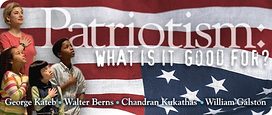Discussions of this sort are more likely to end in clarification of differences than in agreement. In his latest post, for example, Kateb says that “Love of country that expresses itself in killing and dying is not love at all, but some fantastic delusion.” I cannot believe that Kateb really means the full sweep of this declaration. Suppose one’s country is attacked and thousands of fellow-citizens die. Is everything done in response an expression of delusion? Not at all: some reactions are necessary and justified; others are excessive and illegitimate. I favored retaliation against the Taliban, which asked some Americans to kill and die for their country, and vociferously opposed our invasion of Iraq. My distinction between moderate and extreme patriotism tracks this difference. I can only conclude that Kateb rejects this distinction. For him, patriotism is the night in which all cows are black.
Or consider this statement: “In the United States, patriotism and the Constitution are engaged in a permanent civil war against each other.” Here Kateb elides the paradox that he urges us to “live with” in his longer essay on patriotism. Yes, patriotism can lead, has led, to serious breaches of the Constitution. The internment of Japanese-American during World War Two is an enduring blot on our legal order. But it is equally true that without patriotism we would have no Constitution; the nation it imperfectly constituted would have died a century and a half ago.
Lurking behind Kateb’s critique of patriotism is the longing for an almost Kantian moral purity in politics. I take my stand with Max Weber, with the ethic of responsibility that embraces the necessary moral costs of maintaining our collective existence. For as Kateb knows full well, it is only within political community that citizens can hope to practice the ordinary morality we both cherish.

